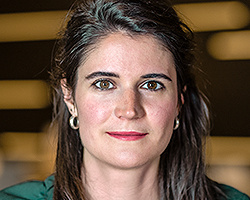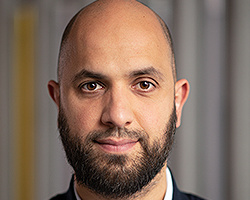Societal perspective
"In secondary school, I was good at economics and mathematics so I chose a Bachelor's degree in econometrics followed by a Master's in actuarial science. An actuary is someone who assesses complex financial risks, for example relating to fire damage to property, ageing and mortality. I then started my career as a consultant at a big-four firm. For me, working in consultancy meant putting in a lot of hours and dealing with various clients. I enjoyed myself, but when I got promoted to a management role, I felt I was at a crossroads: is this really what I want? An assignment I did for DNB as an external consultant created clarity for me. I found it interesting that, as a supervisor, I could continue to conduct substantive discussions with financial institutions, but that I could swap a commercial focus for a more societal perspective And now, more than five years later, I am still working at DNB and I couldn't be happier.
Supervision across the board
I work in Insurance Supervision, specifically in the National Insurance Groups department. As an account supervisor, I am the first point of contact for a major insurer and I supervise them across the board. This means that I look specifically at whether the insurer maintains sufficient buffers to meet its obligations to its policyholders, taking various risks into account. I do so through a number of ways, including by holding periodic meetings with the insurer and reading reports. If something strikes me as unusual, I take action by starting an examination, requesting documents, talking to experts and getting other colleagues involved.
From the war in Ukraine to inflation: many current affairs have an impact on the supervision of insurers.
Topical work
I find the supervision of insurers fascinating partly because it is so topical. Take inflation, for instance. If your house catches fire and you have to rebuild everything, it's going to cost a lot more now than it would have a year ago. What might it mean for an insurer that suddenly has to pay out much more than anticipated? Or take the health insurance premiums that are set annually The insurers themselves set the amount of the premium, we only observe. If the premium goes up, many policyholders may decide to switch to another company. Conversely, an insurer may suddenly gain many new policyholders if the premium goes down. As the number of policyholders increases, so too does the need for more capital to cover potential risks. Is the insurer prepared for these eventualities? Another event that greatly influenced my work was the start of the war in Ukraine. Some insurers had Russian government bonds that were not worth the paper they were printed on at one point. This could have a substantial impact on buffers and, in a worst case scenario, on the insurers' ability to meet obligations to thousands of Dutch policyholders.
Complex subjects
The subjects I deal with on a daily basis are complex, to say the least. This is another reason why I like it so much more at DNB compared to my hectic years as a consultant – now I have more time to get to the bottom of issues. That took some getting used to at first. At the big-four firm, the cycle from assignment to assignment was far more fast-paced and deadlines were tight. At DNB, projects have longer lead times and you get plenty of scope to structure your approach as you see fit. A lot is required of you in terms of your own input and autonomy, as projects must meet a high standard. When deciding on a solution, you have to formulate and defend your own point of view, which is quite a challenge when you can look at a particular topic from different perspectives. That's something you learn to deal with, and when you discuss it with your colleagues you find that you work together even better.
Time for yourself and your family
What I also like about working at DNB is the healthy balance between the work week and your private time. I now have a family with two kids and I enjoy spending a lot of time with them. DNB hosts all kinds of events and activities, and you can decide for yourself whether you wish to participate. There's the JongDNB youth network and Female Capital, which aims to strengthen the position of women at DNB.
As far as the immediate future goes, six months ago I was promoted to lead account supervisor, so I'm fine for now. As a supervisor, however, you cannot stay in the same place for years on end; you need new perspectives from time to time to keep your supervisory senses sharp. In the longer term, I think it would be a really nice challenge – at DNB, of course! – to try something new in a totally different department. DNB actively offers rotations and the organisation provides plenty of support. That really helps build confidence."


